Module 8 Choosing presents Unit 3 Language in use.教学课件
文档属性
| 名称 | Module 8 Choosing presents Unit 3 Language in use.教学课件 | 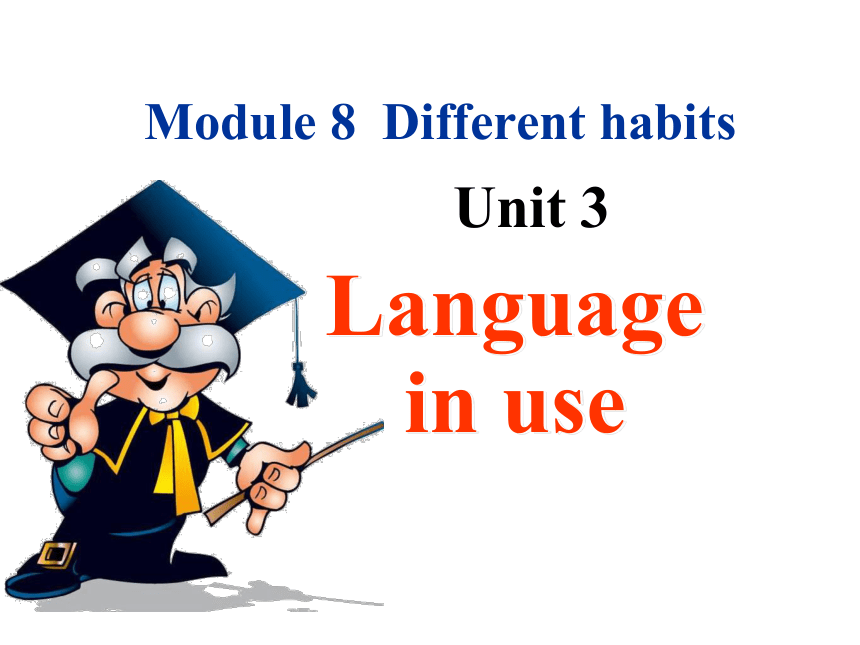 | |
| 格式 | zip | ||
| 文件大小 | 9.9MB | ||
| 资源类型 | 教案 | ||
| 版本资源 | 外研版 | ||
| 科目 | 英语 | ||
| 更新时间 | 2015-02-10 14:31:00 | ||
图片预览

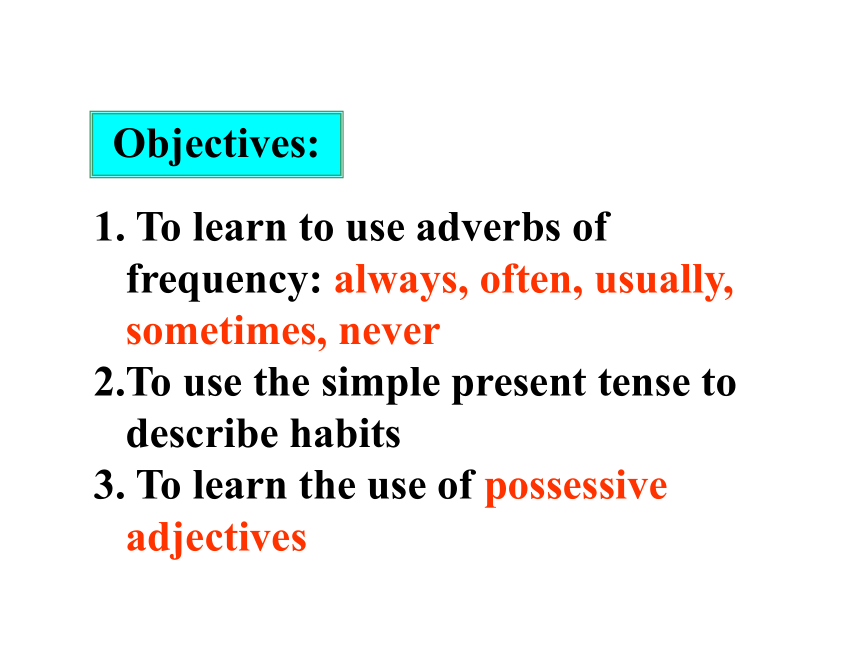
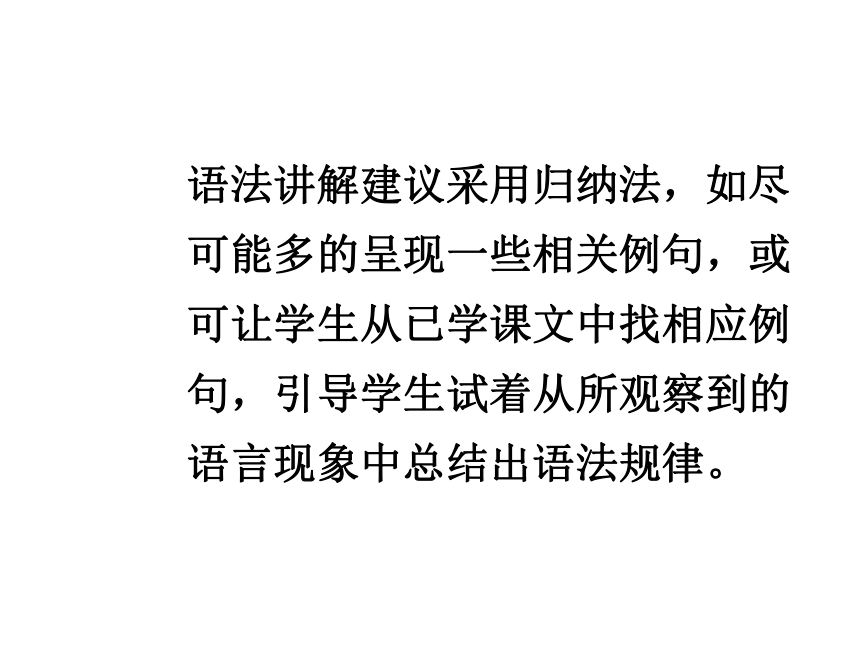
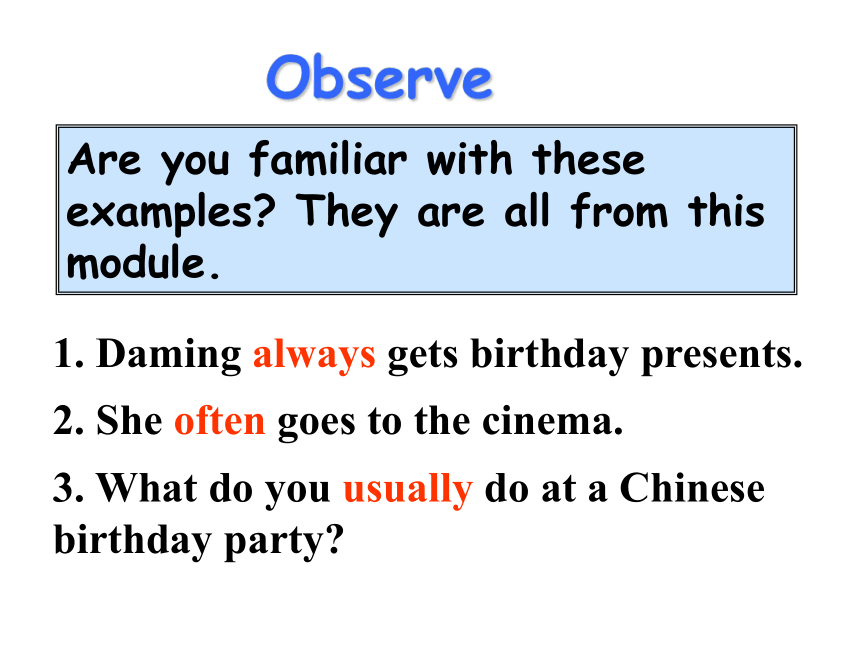
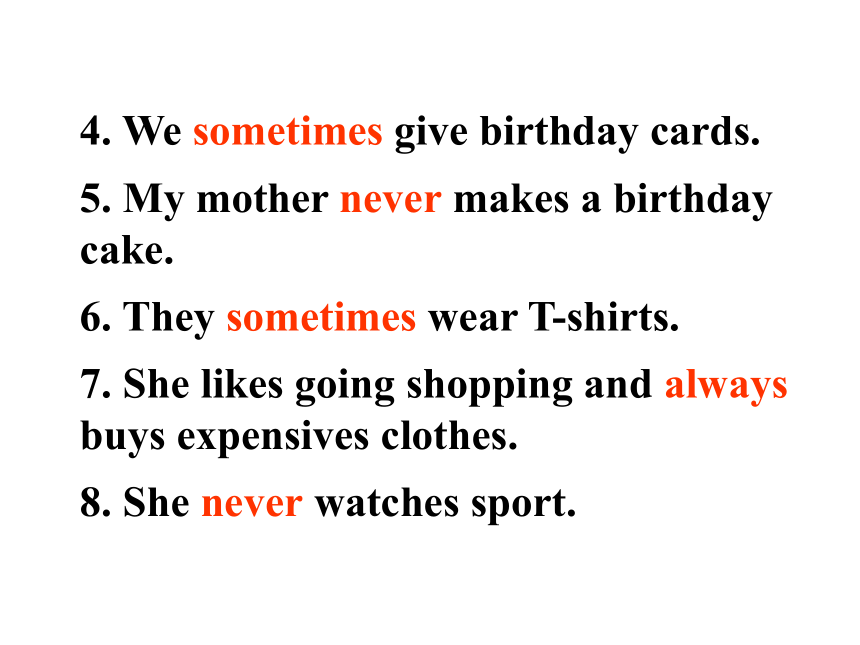


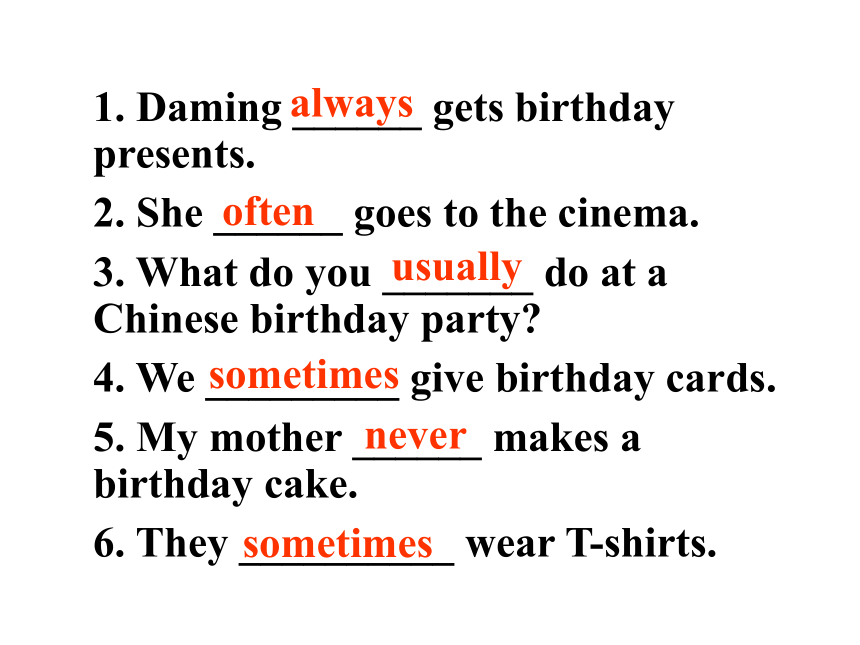
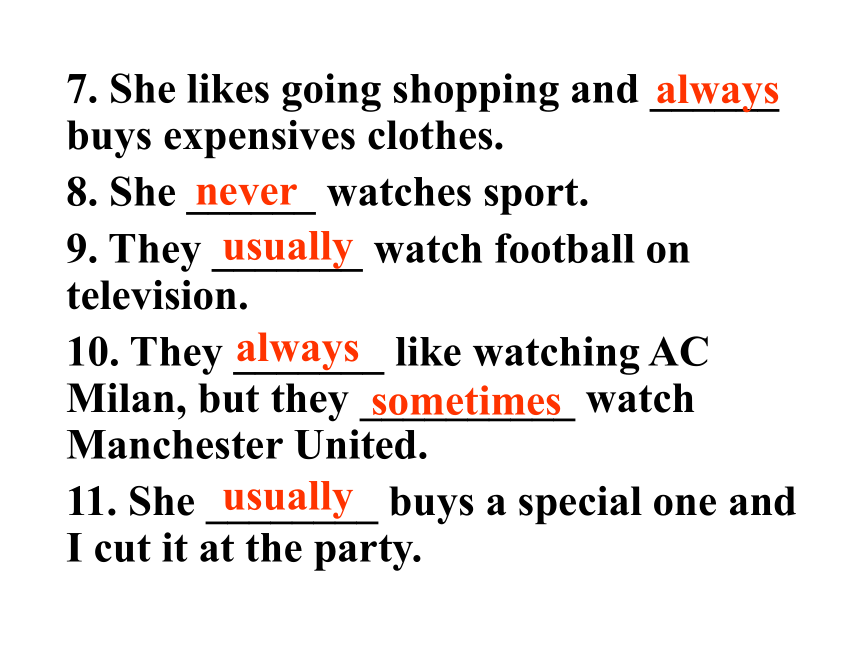
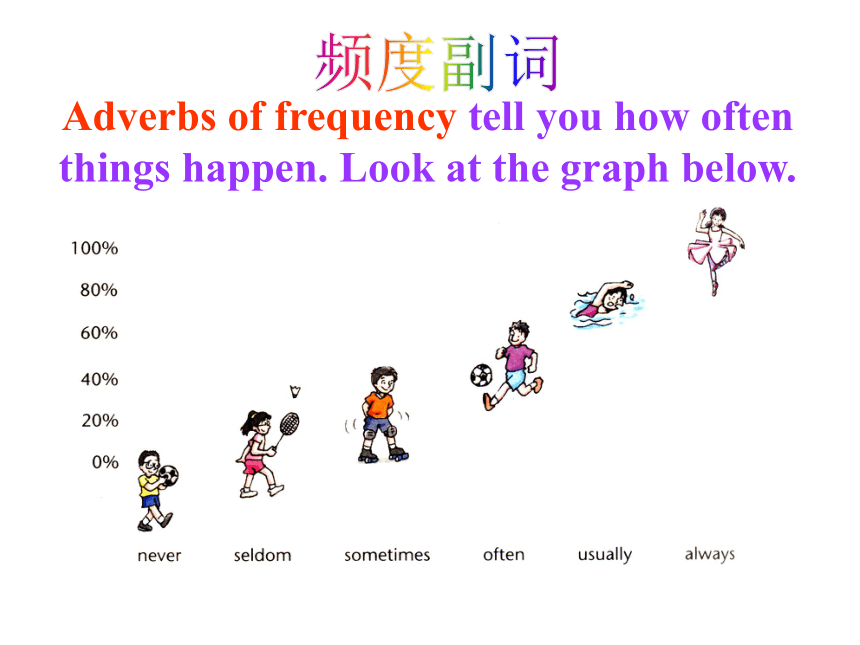
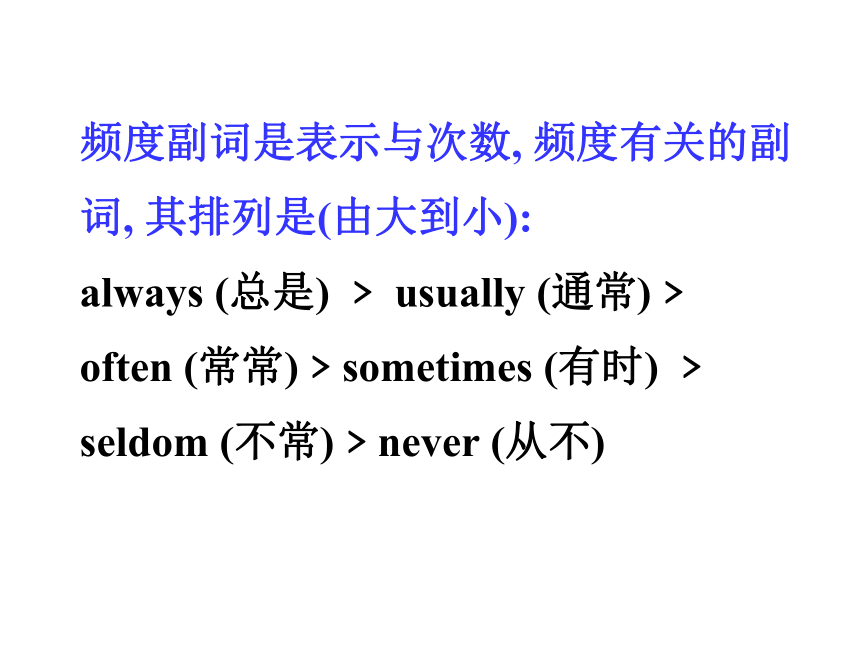

文档简介
课件32张PPT。Unit 3Language in useModule 8 Different habitsObjectives: To learn to use adverbs of frequency: always, often, usually, sometimes, never
To use the simple present tense to describe habits
3. To learn the use of possessive adjectives 语法讲解建议采用归纳法,如尽可能多的呈现一些相关例句,或可让学生从已学课文中找相应例句,引导学生试着从所观察到的语言现象中总结出语法规律。1. Daming always gets birthday presents.
2. She often goes to the cinema.
3. What do you usually do at a Chinese birthday party?ObserveAre you familiar with these examples? They are all from this module.4. We sometimes give birthday cards.
5. My mother never makes a birthday cake.
6. They sometimes wear T-shirts.
7. She likes going shopping and always buys expensives clothes.
8. She never watches sport.9. They usually watch football on television.
10. They always like watching AC Milan, but they sometimes watch Manchester United.
11. She usually buys a special one and I cut it at the party.Guessing game1. to test your sense of observation
2. to test your ability of short-term memory
3. to test your ability of inductive method1. Daming ______ gets birthday presents.
2. She ______ goes to the cinema.
3. What do you _______ do at a Chinese birthday party?
4. We _________ give birthday cards.
5. My mother ______ makes a birthday cake.
6. They __________ wear T-shirts.alwaysoftenusuallysometimesneversometimes7. She likes going shopping and ______ buys expensives clothes.
8. She ______ watches sport.
9. They _______ watch football on television.
10. They _______ like watching AC Milan, but they __________ watch Manchester United.
11. She ________ buys a special one and I cut it at the party.alwaysneverusuallyalwayssometimesusuallyAdverbs of frequency tell you how often
things happen. Look at the graph below.频度副词频度副词是表示与次数, 频度有关的副词, 其排列是(由大到小):
always (总是) ﹥ usually (通常)﹥
often (常常)﹥sometimes (有时) ﹥
seldom (不常)﹥never (从不)1. 频度副词用在be动词后。
It is usually hot in summer.
夏天天气通常是热的。
2. 频度副词用在主要动词前。
My father usually walks home.
我的父亲经常步行回家。
3. 频度副词用在助动词与主要动词之间。
I will always love you.
我将永远爱你。 频度副词在句中的位置:频度副词位置记忆口诀:
Be后 主动前 助主间 How often是对表示频度副词
的时间状语的提问,可翻译为
“多久(一次)”。 We often make a cake for his birthday.
2. She usually buys CDs by her favourite singers.
3. Their favourite clothes are jeans and T-shirts.Observe the following sentences and pay attention to the words in red.4. Some people think it carries water in the humps on its back.
5.How do I write my homework on the computer?
6. Mike and his parents use their home computer.
7. So what would you like for your birthday,Daming?带红色标识的都是形容词性物主代词形容词性物主代词形容性物主代词是物主代词的一种
(另一种为人称代词),置于名词前,
表示某人的。 形容词性物主代词有:my (我的),
your (你的、你们的),our (我们的),
his (他的),her (她的),its (它的),their (他们的)。
形容词性物主代词具有形容词的特性,常放在名词前面作定语,表明该名词所表示的人或物是“谁的”或sth. belongs to sb. 形容词性物主代词相当于形容词,
在句中只能用作定语,后面必须跟名词,
名词性物主代词常用来避免和前面已
提及的名词重复。
用法:形容词性物主代词+名词。例如:
Is that your bike?
那是你的自行车吗?
I'm looking for my glasses. 我在找我的眼镜。 2. 如果名词前用了形容词性物主代词,
就不能再用冠词(a, an, the)、指示代词
(this, that, these, those)等修饰词了。
例如:这是他的书桌。
This is his desk.
3. 与形容词一起修饰名词时,形容词性物
主代词要放在形容词的前面。例如:
his English books 他的英语书,
their Chinese friends 他们的中国朋友。 注意: it’s与its读音相同,he’s与his读音相似,但使用时需注意它们的区别(it’s和he’s分别是it is和he is的缩略形式,但its 和his 却是形容词性物主代词) 。例如:
It’s a bird. Its name is Polly.
它是一只鸟。它的名字叫波利。
He’s a student. His mother is a teacher.
他是一名学生。他妈妈是一位教师。本句意为 “我的朋友不喜欢音乐, 他从不去音乐会”, 故答案为 never。1. My friend doesn’t like music
and he ____ goes to the concert.
A. always B. usually
C. often D. never例题解析2. This is my favourite book. ____
name is Ma Xiaotiao.
A. Its B. It’s C. Itits与it’s读音相同,但意义完全不一样,its是物主代词,意为“它的”,it’s是it is 的缩略,意为“它是”,此处很明显“它的名字是马小跳”,用物主代词,而it为人称代词。 3. Do you often _____ the football match
_____ television?
A. see; on B. watch; on C. look; onlook 单独用时, 表示“看”, 通常要放在句首,“看什么东西”时,通常和 at 连用。
see表示看的结果,即“看到、看见”。
watch表示“观看”,常用于看电视或看比赛等词组中。
read常用于“看书、看报、看杂志”等词组中,有阅读的意思。Review1. 动词第三人称单数形式
present simple he, she, it
2. 频度副词
adverbs of frequency
3. 形容词性物主代词
possessive adjectives 动词第三人称单数的变化规则。① 一般动词后加-s。
② 以s, x, ch, sh,结尾的,后加-es。
③ 以辅音字母+o结尾,一般加-es。
④ 辅音字母+y结尾的单词,变y为i,
再加-es。动词第三人称单数1. — Can your father drive?
—Yes, and he usually _____ to school.
A. drove B. is driving
C. drives D. has driven
2. The weather forecast (天气预报) ____
it will be sunny tomorrow.
A. say B. saying
C. says D. said注: word 文档
点击此处链接一、单项选择。3. Tom _____ to work by bicycle.
A. usually go B. go usually
C. usually goes D. goes usually
4. We often eat dinner at home on
weekends, but ______ we eat out.
A. sometimes B. seldom
C. never D. always 5. Jerry _________ for school.
A. is usually late B. usually is late
C. is late usually D. goes usually late
6. — Do you often exercise, Jason?
— No, _____. I don’t like sports at all.
A. always B. often
C. usually D. never 7. I ____ a girl. ______ name is
Wang Hong.
A. am; My B. is; Her
C. am; Your D. is; His
8. — Is the cat ______ friend?
— Yes, _______.
A. your; it isn’t B. he; it is
C. your; it is D. her; it isn’t1. He ______ TV every evening. (watch)
2. We always ___ to school on foot. (go)
3. Tom, with his classmates, often _____
football after school. (play)
4. Your shoes _____ under the bed. (be)
5. His uncle usually ____ to work by bus.
(go)
6. I always ___ up at six in the morning.
(get)
7. He never ______ a cake himself. (make)
8. John _____ like his father. (look)二、用所给动词的适当形式填空。watchesgoplaysaregoesget makes looksReview the grammar we have learned today.Homework1. To preview the new words and
expressions in Module 9 Unit 1
2. To preview the passage in
Module 9 Unit 1PreviewThank you~
To use the simple present tense to describe habits
3. To learn the use of possessive adjectives 语法讲解建议采用归纳法,如尽可能多的呈现一些相关例句,或可让学生从已学课文中找相应例句,引导学生试着从所观察到的语言现象中总结出语法规律。1. Daming always gets birthday presents.
2. She often goes to the cinema.
3. What do you usually do at a Chinese birthday party?ObserveAre you familiar with these examples? They are all from this module.4. We sometimes give birthday cards.
5. My mother never makes a birthday cake.
6. They sometimes wear T-shirts.
7. She likes going shopping and always buys expensives clothes.
8. She never watches sport.9. They usually watch football on television.
10. They always like watching AC Milan, but they sometimes watch Manchester United.
11. She usually buys a special one and I cut it at the party.Guessing game1. to test your sense of observation
2. to test your ability of short-term memory
3. to test your ability of inductive method1. Daming ______ gets birthday presents.
2. She ______ goes to the cinema.
3. What do you _______ do at a Chinese birthday party?
4. We _________ give birthday cards.
5. My mother ______ makes a birthday cake.
6. They __________ wear T-shirts.alwaysoftenusuallysometimesneversometimes7. She likes going shopping and ______ buys expensives clothes.
8. She ______ watches sport.
9. They _______ watch football on television.
10. They _______ like watching AC Milan, but they __________ watch Manchester United.
11. She ________ buys a special one and I cut it at the party.alwaysneverusuallyalwayssometimesusuallyAdverbs of frequency tell you how often
things happen. Look at the graph below.频度副词频度副词是表示与次数, 频度有关的副词, 其排列是(由大到小):
always (总是) ﹥ usually (通常)﹥
often (常常)﹥sometimes (有时) ﹥
seldom (不常)﹥never (从不)1. 频度副词用在be动词后。
It is usually hot in summer.
夏天天气通常是热的。
2. 频度副词用在主要动词前。
My father usually walks home.
我的父亲经常步行回家。
3. 频度副词用在助动词与主要动词之间。
I will always love you.
我将永远爱你。 频度副词在句中的位置:频度副词位置记忆口诀:
Be后 主动前 助主间 How often是对表示频度副词
的时间状语的提问,可翻译为
“多久(一次)”。 We often make a cake for his birthday.
2. She usually buys CDs by her favourite singers.
3. Their favourite clothes are jeans and T-shirts.Observe the following sentences and pay attention to the words in red.4. Some people think it carries water in the humps on its back.
5.How do I write my homework on the computer?
6. Mike and his parents use their home computer.
7. So what would you like for your birthday,Daming?带红色标识的都是形容词性物主代词形容词性物主代词形容性物主代词是物主代词的一种
(另一种为人称代词),置于名词前,
表示某人的。 形容词性物主代词有:my (我的),
your (你的、你们的),our (我们的),
his (他的),her (她的),its (它的),their (他们的)。
形容词性物主代词具有形容词的特性,常放在名词前面作定语,表明该名词所表示的人或物是“谁的”或sth. belongs to sb. 形容词性物主代词相当于形容词,
在句中只能用作定语,后面必须跟名词,
名词性物主代词常用来避免和前面已
提及的名词重复。
用法:形容词性物主代词+名词。例如:
Is that your bike?
那是你的自行车吗?
I'm looking for my glasses. 我在找我的眼镜。 2. 如果名词前用了形容词性物主代词,
就不能再用冠词(a, an, the)、指示代词
(this, that, these, those)等修饰词了。
例如:这是他的书桌。
This is his desk.
3. 与形容词一起修饰名词时,形容词性物
主代词要放在形容词的前面。例如:
his English books 他的英语书,
their Chinese friends 他们的中国朋友。 注意: it’s与its读音相同,he’s与his读音相似,但使用时需注意它们的区别(it’s和he’s分别是it is和he is的缩略形式,但its 和his 却是形容词性物主代词) 。例如:
It’s a bird. Its name is Polly.
它是一只鸟。它的名字叫波利。
He’s a student. His mother is a teacher.
他是一名学生。他妈妈是一位教师。本句意为 “我的朋友不喜欢音乐, 他从不去音乐会”, 故答案为 never。1. My friend doesn’t like music
and he ____ goes to the concert.
A. always B. usually
C. often D. never例题解析2. This is my favourite book. ____
name is Ma Xiaotiao.
A. Its B. It’s C. Itits与it’s读音相同,但意义完全不一样,its是物主代词,意为“它的”,it’s是it is 的缩略,意为“它是”,此处很明显“它的名字是马小跳”,用物主代词,而it为人称代词。 3. Do you often _____ the football match
_____ television?
A. see; on B. watch; on C. look; onlook 单独用时, 表示“看”, 通常要放在句首,“看什么东西”时,通常和 at 连用。
see表示看的结果,即“看到、看见”。
watch表示“观看”,常用于看电视或看比赛等词组中。
read常用于“看书、看报、看杂志”等词组中,有阅读的意思。Review1. 动词第三人称单数形式
present simple he, she, it
2. 频度副词
adverbs of frequency
3. 形容词性物主代词
possessive adjectives 动词第三人称单数的变化规则。① 一般动词后加-s。
② 以s, x, ch, sh,结尾的,后加-es。
③ 以辅音字母+o结尾,一般加-es。
④ 辅音字母+y结尾的单词,变y为i,
再加-es。动词第三人称单数1. — Can your father drive?
—Yes, and he usually _____ to school.
A. drove B. is driving
C. drives D. has driven
2. The weather forecast (天气预报) ____
it will be sunny tomorrow.
A. say B. saying
C. says D. said注: word 文档
点击此处链接一、单项选择。3. Tom _____ to work by bicycle.
A. usually go B. go usually
C. usually goes D. goes usually
4. We often eat dinner at home on
weekends, but ______ we eat out.
A. sometimes B. seldom
C. never D. always 5. Jerry _________ for school.
A. is usually late B. usually is late
C. is late usually D. goes usually late
6. — Do you often exercise, Jason?
— No, _____. I don’t like sports at all.
A. always B. often
C. usually D. never 7. I ____ a girl. ______ name is
Wang Hong.
A. am; My B. is; Her
C. am; Your D. is; His
8. — Is the cat ______ friend?
— Yes, _______.
A. your; it isn’t B. he; it is
C. your; it is D. her; it isn’t1. He ______ TV every evening. (watch)
2. We always ___ to school on foot. (go)
3. Tom, with his classmates, often _____
football after school. (play)
4. Your shoes _____ under the bed. (be)
5. His uncle usually ____ to work by bus.
(go)
6. I always ___ up at six in the morning.
(get)
7. He never ______ a cake himself. (make)
8. John _____ like his father. (look)二、用所给动词的适当形式填空。watchesgoplaysaregoesget makes looksReview the grammar we have learned today.Homework1. To preview the new words and
expressions in Module 9 Unit 1
2. To preview the passage in
Module 9 Unit 1PreviewThank you~
同课章节目录
- Starte
- Module 1 My teacher and my friends
- Module 2 My English lesson
- Module 3 My English book
- Module 4 My everyday life
- Module 1 My classmates
- Unit 1 Nice to meet you.
- Unit 2 I'm Wang Lingling and I'm thirteen years ol
- Unit 3 Language in use.
- Module 2 My family
- Unit 1 Is this your mum?
- Unit 2 These are my parents.
- Unit 3 Language in use.
- Module 3 My school
- Unit 1 There are thirty students in my class.
- Unit 2 The library is on the left of the playgroun
- Unit 3 Language in use.
- Module 4 Healthy food
- Unit 1 We've got lots of apples.
- Unit 2 Is your food and drink healthy?
- Unit 3 Language in use.
- Module 5 My school day
- Unit 1 I love history.
- Unit 2 We start work at nine o'clock.
- Unit 3 Language in use.
- Revision module A
- Module 6 A trip to the zoo
- Unit 1 Does it eat meat?
- Unit 2 The tiger lives in Asia.
- Unit 3 Language in use.
- Module 7 Computers
- Unit 1 How do I write my homework on the computer?
- Unit 2 When do you use a computer?
- Unit 3 Language in use.
- Module 8 Choosing presents
- Unit 1 I always like birthday parties.
- Unit 2 She often goes to concerts.
- Unit 3 Language in use.
- Module 9 People and places
- Unit 1 We're enjoying the school trip a lot.
- Unit 2 They're waiting for buses or trains.
- Unit 3 Language in use.
- Module 10 Spring Festival
- Unit 1 Are you getting ready for Spring Festival?
- Unit 2 My mother's cleaning our houses and sweepin
- Unit 3 Language in use.
- Revision module B
